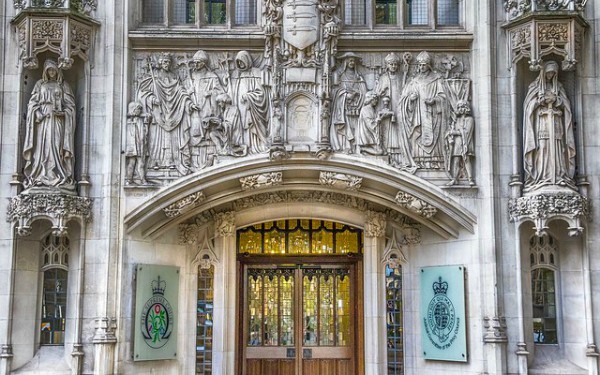
Social workers face a sharp hike in Deprivation of Liberty Safeguards (Dols) cases following a landmark Supreme Court ruling.
All people who lack the capacity to make decisions about their care and residence and, under the responsibility of the state, are subject to continuous supervision and control and lack the option to leave their care setting are deprived of their liberty, ruled the court.
The ruling – in the cases of P v Cheshire West and Chester Council and P&Q v Surrey County Council – threw out previous judgements that had defined deprivation of liberty more restrictively.
The person’s compliance or lack of objection to their placement, the purpose of it or the extent to which it enables them to to live a relatively normal life for someone with their level of disability were all irrelevant to whether they were deprived of their liberty, ruled the court.
This means that many people are likely to have been deprived of their liberty unlawfully and without safeguards in settings including care homes and supported living placements. This suggests that proper application of today’s judgement would see a significant hike in Dols case numbers regarding care home placements, and also applications to the Court of Protection to authorise deprivations of liberty in supported living.
Both cases involved appeals against separate Court of Appeal decisions that a learning disabled man, P, and two learning disabled sisters, known as MIG and MEG (or P and Q), had not been deprived of their liberty.
Cheshire case
Since 2009, P had lived in a supported living bungalow with other residents, Z House, and received substantial one-to-one care and supervision. He could also be subject to physical intervention to manage behaviour including tearing his incontinence pads and putting the pieces in his mouth.
The Court of Appeal, overturning a previous Court of Protection judgement, had ruled in 2011 that this was not a deprivation of liberty because P’s life was as normal as possible for someone with his level of disability and he would require the same level of supervision in any other setting.
But the Supreme Court rejected this, unanimously, saying disabled people should not face a tougher standard for being deprived of their liberty than non-disabled people.
Giving judgement, Baroness Hale said: “If it would be a deprivation of my liberty to be obliged to live in a particular place, subject to
constant monitoring and control, only allowed out with close supervision, and unable to move away without permission even if such an opportunity became available, then it must also be a deprivation of the liberty of a disabled person. The fact that my living arrangements are comfortable, and indeed make my life as enjoyable as it could possibly be, should make no difference. A gilded cage is still a cage.”
Surrey case
In the other case, MIG had been placed following care proceedings with a foster mother, aged 16, in 2007, to whom she was devoted and had never attempted to leave, though would be restrained if she did so. MEG was moved from foster care to a specialist NHS supported living facility to help manage her ‘challenging behaviour’ and, though subject to continuous supervision and control, showed no desire to go out on her own.
The Court of Appeal had, in 2011, upheld a previous Court of Protection ruling that neither sister were deprived of their liberty, because of the “relative normality” of the sisters’ lives and their lack of objection to their accommodation.
On this case, the Supreme Court split four to three in favour of the judgement that MIG and MEG were deprived of their liberty.
Giving the lead judgement in favour of the ruling, Hale said: “If the acid test is whether a person is under the complete supervision and control of those caring for her and is not free to leave the place where she lives, then the truth is that both MIG and MEG are being deprived of their liberty. Furthermore, that deprivation is the responsibility of the state.” Were a similar level of control exercised in a family setting, it would not constitute a deprivation of liberty, she said.
For her judgement and proposed acid test for a deprivation of liberty, Hale drew on European Court of Human Rights judgements interpreting Article 5 of the European Convention on Human Rights, the right to liberty and security.
However, dissenting from the majority judgement, Lords Carnworth, Hodge and Clarke said the European court had not ruled on a case where people had been placed in a small group or domestic setting as MIG and MEG had been. They said the European court had ruled that deprivation of liberty should be judged on a “case specific” basis, not on a universal test such a Hale’s. They also argued that the degree of intrusion into a person’s life was relevant to whether they were deprived of their liberty, and that the two sisters’ care regime was no more intrusive than it needed to be for their protection and well-being.
Ruling means many deprived without liberty
Commenting on the judgement, leading Court of Protection barrister Victoria Butler-Cole, of 39 Essex Street Chambers, said: “If this judgement is right then there are a lot of people deprived of their liberty who are not authorised as such, and a lot of people who have been recently assessed as not being deprived of their liberty who will need to be reassessed.”
Butler-Cole, who was speaking at today’s Community Care conference on the Mental Capacity Act and Dols, added: “This ruling changes substantially the approach that should be take to deprivation of liberty. It’s very clear; there’s not a lot of wriggle room. So many of these factors that we thought were relevant have been completely taken out.” These included whether the person was objecting to their confinement and how frequently they went out of their care setting, she said, neither of which were relevant according to today’s ruling.
Wayne Martin, director of the Essex Autonomy Project, which provides training to social care professionals on the law and ethics surrounding capacity, said the judgement had a “beautiful clarity at the level of principle” but left some questions unanswered.
He said Article 5 – on which the judgement was based – “only really protects people whose care is attributable to the state”.
He added: “You can’t really rely on Article 5 to protect people who are in care. It’s no substitute for some proper system of oversight.”
He said this underscored the need to reform the Dols, as proposed by the House of Lords committee into the MCA, which reported last week.
Martin suggested the Law Commission – whose review into the law around mental incapacity led to the MCA – might conduct a review of the Dols to devise a new way of protecting the rights of people deprived of their liberty in care.
He added: “We might look to the Mental Health Act for guidance. It’s legislation that has evolved over centuries and now provides some pretty robust protections, through the system of tribunal and regular reviews of detention.”




 Family help: one local authority’s experience of the model
Family help: one local authority’s experience of the model  ‘I spent the first three months listening’: how supportive leadership can transform children’s services
‘I spent the first three months listening’: how supportive leadership can transform children’s services  How senior leaders in one authority maintain a culture of excellence
How senior leaders in one authority maintain a culture of excellence  How staff support ensures fantastic outcomes for children and families
How staff support ensures fantastic outcomes for children and families  Workforce Insights – showcasing a selection of the sector’s top recruiters
Workforce Insights – showcasing a selection of the sector’s top recruiters 

 Facebook
Facebook X
X LinkedIn
LinkedIn Instagram
Instagram
Comments are closed.